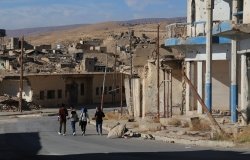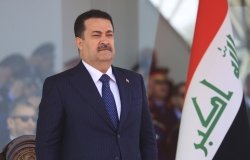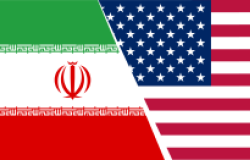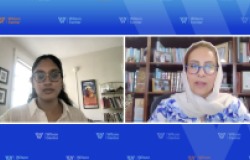An Informal Discussion with Kuwaiti Women's Rights Activists
Overview
Summary of the meeting co-sponsored by Middle East Project and the Kuwait Information Office with Iqbal Sulaiman Al-Ahmad, Advisor to the United Nations Development Program and former Editor-in-Chief of the Kuwait News Agency; and Lulwah Saleh Al-Mulla, Secretary General of the Women's Social and Cultural Society (Kuwait) and leading Kuwaiti activist on women's rights.
Iqbal Sulaiman Al-Ahmad and Lulwah Saleh discussed the role and status of women in Kuwait. Saleh Al-Mulla opened the meeting by saying that Kuwaiti women's rights activists are striving hard to change the perception of women being "weak figures" in Kuwaiti society. She noted that the age for legal marriage has been increased to fifteen years for girls. Sulaiman Al-Ahmad added that "the divorce rate is very high" in Kuwait, and the court system makes it very difficult for men to divorce their wives; typically, the husband must go to court three to four times before the case is even heard. If the couple has children, women have custody rights until the children are in their teens. She attributed the mother's right of custody to cultural traditions.
In 1999, the Emir of Kuwait issued a decree giving women the right to vote. However, women have not yet been granted suffrage. Since the Emir's decree, "the right to vote has become all the more important" said Saleh Al-Mulla. Activists are currently engaged in activities to make women aware of "their right to vote, nominate, win approval of a segment in society by conducting seminars, discussion circles, and to allow women to enhance their role and earn that constitutional right." The Women and Cultural Society, of which she serves as Secretary General, is an integral part of that mission. The organization sponsors programs focused on issues such as: early childhood education, education for the hearing impaired, rehabilitation for the ill, support for working mothers, social development, funding for families in need of financial assistance, and youth volunteer groups.
Asked how Western feminist ideology was perceived amongst Kuwaiti women, the speakers responded that "feminism" is possible, by carefully adjusting the concept to religious and cultural norms.
In conclusion, Sulaiman Al-Ahmad pointed out that Kuwaiti women need support from the world at large in order to advance the rights movement within their country. She urged support from other women's associations within the Arab countries, the Islamic world, and forces from feminist organizations outside of Kuwait.
Hosted By

Middle East Program
The Wilson Center’s Middle East Program serves as a crucial resource for the policymaking community and beyond, providing analyses and research that helps inform US foreign policymaking, stimulates public debate, and expands knowledge about issues in the wider Middle East and North Africa (MENA) region. Read more
Thank you for your interest in this event. Please send any feedback or questions to our Events staff.










